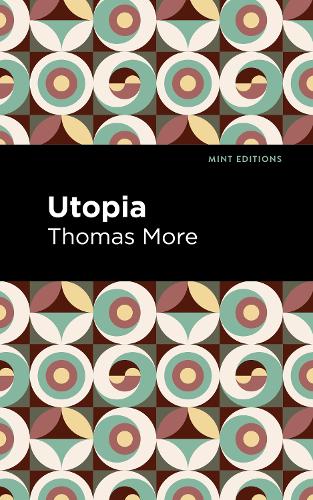
Utopia
(Hardback)
Available Formats
Paperback
Published: 21st November 2012
Paperback
Published: 1st September 2017
Hardback
Published: 15th January 1999
Paperback
Published: 26th October 2009
Paperback
Published: 15th January 1999
Hardback
Published: 3rd March 2020
Hardback
Published: 29th May 1992
Paperback
Published: 1st April 2024
Paperback, New edition
Published: 5th March 1997
Hardback
Published: 24th May 2022
Publishing Details
Utopia
By (Author) Thomas More
Contributions by Mint Editions
West Margin Press
West Margin Press
24th May 2022
United States
Classifications
General
Fiction
Dystopian and utopian fiction
Classic fiction: literary and general
321.07
Physical Properties
Hardback
100
Width 127mm, Height 203mm
Description
Utopia (1516) is a work of political satire by Thomas More. Published in Latin while More was serving as Privy Counsellor under King Henry VIII, the text is stylized as a true account of a new civilization discovered in the New World by traveler Raphael Hythlodaeus. While there have been varying interpretations of Utopia over the centuries, it is most consistently regarded as a work of political philosophy in the tradition of Platos Republic that satirizes European society by contrast with the laws and traditions of the Utopian people. The island of Utopia is in the middle two hundred miles broad, and holds almost at the same breadth over a great part of it, but it grows narrower towards both ends. Its figure is not unlike a crescent. For centuries, Utopia has been seen as an essential work of Renaissance humanism for its vision of a just and highly organized political system characterized by the abolition of private property, communal values, full employment, and free accessible healthcare. While scholars have long debated whether More envisioned his Utopia as a positive representation of society or as merely an unattainable vision of life on earth, his work remains an essential contribution to political discourse that continues to inform readers today. This edition of Thomas Mores Utopia is a classic work of English literature reimagined for modern readers.
Since our inception in 2020, Mint Editions has kept sustainability and innovation at the forefront of our mission. Each and every Mint Edition title gets a fresh, professionally typeset manuscript and a dazzling new cover, all while maintaining the integrity of the original book.
With thousands of titles in our collection, we aim to spotlight diverse public domain works to help them find modern audiences. Mint Editions celebrates a breadth of literary works, curated from both canonical and overlooked classics from writers around the globe.
Author Bio
Thomas More (1478-1535) was an English lawyer, judge, philosopher, statesman, and humanist. Born in London, he was the second of six children born to Sir John More and his wife Agnes. From 1490 to 1492, he served as household page for Archbishop of Canterbury John Morton, who introduced him to Renaissance humanism and nominated him for a spot at the University of Oxford. After two years of learning Latin and Greek, he left to study law and was called to the Bar in 1502. Two years later, he was elected to Parliament, launching his political career in earnest. In 1516, while serving as Privy Counsellor, More published Utopia, a work of political philosophy and social satire that describes the customs of a fictional island nation. After a series of prominent posts in the court of King Henry VIII, More succeeded Thomas Wolsey as Lord Chancellor in 1529, making him one of the most powerful men in England. His three-year reign was mired in controversy, as he worked to impede the influence of the Protestant Reformation through the persecution of heretics and the suppression of Lutheran books, especially the Tyndale Bible. In 1530, he refused to sign a letter to Pope Clement VII that sought to annul Henrys marriage to Catherine of Aragon, damaging his relationship with the King and distancing himself from clergymen loyal to the crown. After resigning in 1532, he further enraged the King by refusing to attend the coronation of Anne Boleyn, leading to a series of charges orchestrated by Thomas Cromwell. His refusal to take the Oath of Supremacy, which recognized the King as the figurehead of a new Church of England, would culminate in his being found guilty of high treason in 1535. Five days after his trial by jury, More was beheaded at Tower Hill. Recognized as a martyr by the Catholic Church, he was canonized as a saint in 1935 by Pope Pius XI.
